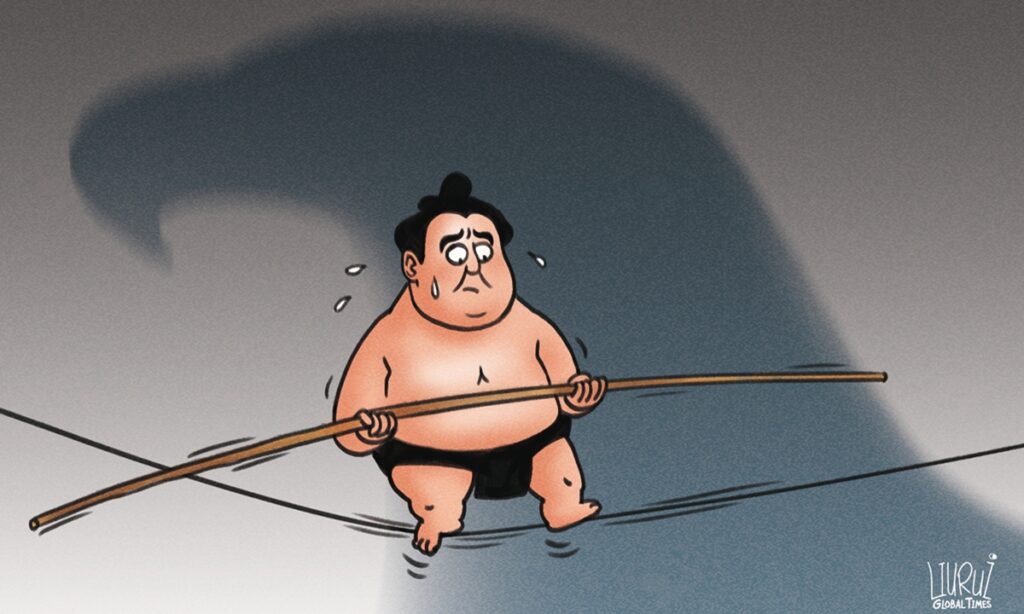In pursuit of an economic way out of its current predicament, Japan is facing a crucial choice: whether to jump with both feet onto the US chariot and jointly oppose China, or to adopt a strategy that is in their own interests to minimize the risks for their economy.
Japan is running a current account deficit of 132.4 billion yen ($980 million) in June, government data showed on Monday, marking the first monthly deficit since January as surging imports eclipsed exports.
The data highlights the widening trade deficit facing the world’s third-largest economy this year, in addition to a relatively weak yen, and rising prices. Despite a recent rally, the yen depreciated sharply against the dollar throughout the year to date, at one point hitting a 24-year low of 139.38 per dollar in July.
All of these data actually point to the fact that the Japanese economy is trapped in a structural vicious cycle. High energy prices and relatively old domestic industries have contributed to trade deficit, which indirectly caused a depreciation of the yen, making the prices of energy products more expensive and leading to more serious trade deficit.
The aging population and sluggish domestic demand are the main reasons behind Japan’s economic woes, with no effective way out available yet. But it is also important to note that Japan’s economic development is heavily dependent on the external environment and conditions. That means if Japan miscalculates in its foreign policy and the international situation, the consequent impact on the Japanese economy could be huge, sometimes even fatal.
The Japanese side has showed deliberate closeness to the US on many issues including the so-called chip alliance issue.
At the end of July, the US and Japan agreed to set up a new joint research center for high-tech chips during their so-called economic “two-plus-two” ministerial meeting in Washington, which observers said aims to thwart China’s chip ambition, according to Reuters. Japan is a member of the US-led CHIP 4 alliance, compared with South Korea’s skepticism and concerns about the group’s potential purpose of excluding China.
If Japan’s economic woes continue to worsen or even lead to a recession, Japan’s political speculation should be blamed.
Apparently, the Japanese political elite are now preoccupied with how to follow the US lead in containing China. However, blindly following a country that puts its own interests first and expressing unnecessary hostility to a neighbor may ultimately cause a backlash that will cause more harm than benefits.
Historically speaking, the lesson of the US strangling of Japanese semiconductor sector may still be of reference today. If Japan follows the US on the chip supply chain issue, this will likely weaken Japan’s own industrial strength given the past experience which showed that US-Japan cooperation often ended up with Japan losing market share to the US. So the Biden administration’s proposal of an ideological value-based semiconductor supply chain will only benefit US industry not Japanese ones.
Moreover, if Japan blindly caters to the unreasonable demands of the US, this will likely be at the expense of cooperation and development between China and Japan. The past several years saw Japanese exports of semiconductors, relevant raw materials, electronic parts and equipments to China become a major driving forces for the former’s exports. Japan is increasingly reliant on Chinese manufacturing and market when it comes to chip supply chain. If Japan joins forces with the US in containing China, they will suffer huge loss by losing a major export strength.
The Japanese economy has already taken a hard hit from the Russia-Ukraine conflict, but what has really hurt its long-term economic potential is its dangerous political speculation. Japan needs to consider whether to take the misleading path of the US or to choose a path that is more in line with its interests and the regional stability. To gain more room to maneuver in both political and economic levels to avoid more shocks to its economy, Japan is advised to maintain a rational approach to external affairs wherever possible.
(Global Times)




